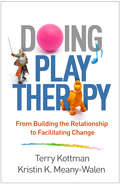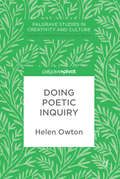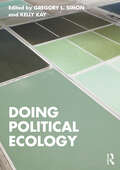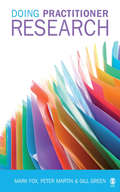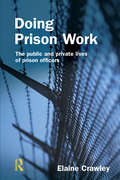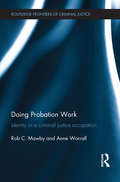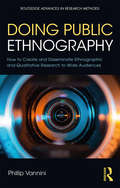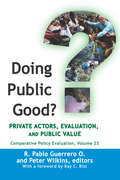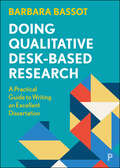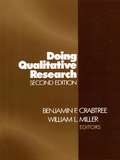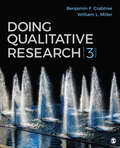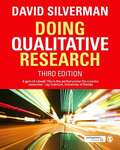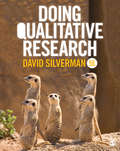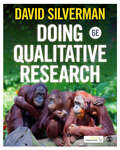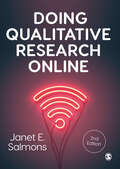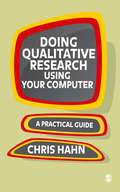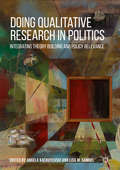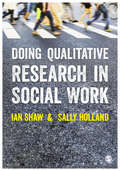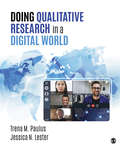- Table View
- List View
Doing Play Therapy: From Building the Relationship to Facilitating Change (Creative Arts and Play Therapy)
by Terry Kottman Kristin K. Meany-WalenCovering the process of therapy from beginning to end, this engaging text helps students and practitioners use play confidently and effectively with children, adolescents, and adults struggling with emotional or behavioral problems or life challenges. With an accessible theory-to-practice focus, the book explains the basics of different play therapy approaches and invites readers to reflect on and develop their own clinical style. It is filled with rich case material and specific examples of play techniques and strategies. The expert authors provide steps for building strong relationships with clients; exploring their clinical issues and underlying dynamics; developing and working toward clear treatment goals; and collaborating with parents and teachers. A chapter on common challenges offers insightful guidance for navigating difficult situations in the playroom.
Doing Poetic Inquiry
by Helen OwtonThis book offers a phenomenologically-inspired approach to sharing stories via 'poetic inquiry', a research approach that is rapidly gaining popularity within psychology and the wider social sciences. Owton begins by framing how poetry can appeal to all of the senses, how it can offer readers a shared experience of the world and why poetry should be used as a research approach. Chapters explore various aspects of poetic inquiry including poetry as data, turning data into poetry, poetry as literature review and poetry as reflective writing. The final chapters consider how one might draw on characterising traits to judge poetic inquiry, and how poetry might resonate with audiences to effect wider dissemination of research. This interdisciplinary exploration will be of interest to scholars in psychology, sociology, social work, and literature, as well as to medical and sports practitioners.
Doing Political Ecology
by Gregory L. Simon Kelly KaySince its inception, the field of political ecology has served as a critical hub for inclusive and transformative environmental inquiry. Doing Political Ecology offers a distinctive entry point into this ever-growing field and argues that our scholarly “foundations,” today more than ever, comprise a cross-cutting latticework of research approaches and concepts.This volume brings together 28 leading scholars from a range of backgrounds and geographies, with contributions organized into 18 analytical lenses that highlight different approaches to critical environmental research and “ways of seeing” nature-society interactions. The book's contributors engage the breadth and depth of the field, recognizing a variety of roots and genealogies, and give ample voice to these rich and complementary lineages. This inclusive presentation of the field allows diverse theoretical and empirical approaches to intermingle in novel ways. Readers will emerge with a wide-ranging understanding of political ecology and will attain a diverse toolkit for evaluating human–environment interactions.Each chapter astutely grounds key methodological, theoretical, topical, and conceptual approaches that animate a range of influential, cutting-edge, and complementary ways of “doing” political ecology.
Doing Practitioner Research
by Dr Peter Martin Mark Fox Dr Gill GreenDoing Practitioner Research focuses on helping practitioners conduct research in their own organisations, and attention is given to the best methods for doing this effectively and sensitively. The authors also attend to the theoretical, political and organisational context of doing research, as well as addressing the ethical and practical issues of undertaking research. The authors cover in detail the range of skills and techniques necessary to make a successful start to the process of becoming an effective practitioner researcher. This is an ideal text for growing number of practitioners working in health, education and social care who are undertaking research. Fox et al have provided the perfect introduction to why practitioners are in the unique position to conduct research that actually improves professional practice. This book will be essential reading for those professionals/practitioners engaged in research in their own organisation or undertaking a post-graduate qualification in Health, Social Care, or Education.
Doing Prison Work
by Elaine M CrawleyThis book provides a much-needed sociological account of the social world of the English prison officer, making an original contribution to our understanding of the inner life of prisons in general and the working lives of prison officers in particular. As well as revealing how the job of the prison officer - and of the prison itself - is accomplished on a day-to-day basis, the book explores not only what prison officers do but also how they feel about their work. In focusing on how prison officers feel about their work this book makes a number of interesting revelations - about the essentially domestic nature of much of the work they do, about the degree of emotional labour invested in it and about the performance nature of many of the day-to-day interactions between officers and prisoners. Finally, the book follows the prison officer home after work, showing how the prison can spill over into their home lives and family relationships. Based on extensive ethnographic fieldwork in different types of prisons (including interviews with prison officers' wives and children as well as prison officers themselves), this book will be essential reading for all those with an interest in how prisons and organisations more generally operate in practice.
Doing Probation Work: Identity in a Criminal Justice Occupation (Routledge Frontiers of Criminal Justice)
by Anne Worrall Rob MawbyA great deal has been written about the political, policy and practice changes that have shaped probation work but little has been written on the changes to occupational cultures and the ways in which probation workers themselves view their role. This book fills that gap by exploring the meaning of ‘doing probation work’ from the perspective of probation workers themselves. Based on 60 extensive interviews with probation workers who joined the probation service from the 1960s to the present day, this book reaches beyond criminological and policy analysis to an application of sociological and organizational theory to rich qualitative data. It explores the backgrounds and motivations of probation workers, their changing relationships with other criminal justice agencies, and the complex public perceptions and media representations of probation work. The book considers the relative influences of religion, the union, diversity and feminization and, while it acknowledges that probation work is stressful, it draws innovatively on sociological and organizational concepts to categorize how workers respond to turbulent times. This book challenges the dominant narrative of probation’s decline in recent literature and constructs three ‘ideal types’ of probation worker - ‘lifers’, ‘second careerists’ and ‘offender managers.’ Each makes an essential contribution to probation cultures, which collectively contribute to, rather than undermine, the effectiveness of offender management and the future of probation work. This book will be important reading for researchers in the disciplines of criminology, criminal justice, sociology and management as well as probation workers of all grades and those in training.
Doing Public Ethnography: How to Create and Disseminate Ethnographic and Qualitative Research to Wide Audiences (Routledge Advances in Research Methods)
by Phillip VanniniEthnography and qualitative research methodology in general have witnessed a staggering proliferation of styles and genres over the last three decades. Modes and channels of communication have similarly expanded and diversified. Now ethnographers have the opportunity to disseminate their work not only through traditional writing but also through aural, visual, performative, hypertext, and many diverse and creative multimodal documentation strategies. Yet, many ethnographers still feel insufficiently proficient with these new literacies and opportunities for knowledge mobilization, and they therefore still limit themselves to traditional modes of communication in spite of their desire for innovation. As university-based, community-driven and politically mandated agendas for broader knowledge transfer keep increasing worldwide, the demand for public scholarship continues to grow. Arguing for the need to disseminate innovative ethnographic knowledge more widely and more effectively, this book outlines practical strategies and tools for sharing ethnographic and qualitative research through widely accessible media such as magazines, trade books, blogs, newspapers, video, radio, and social media. Drawing from practical experiences and hands-on lessons, Doing Public Ethnography provides social scientists across all disciplines with concrete tactics for mobilizing knowledge beyond the academic realm.
Doing Public Good?: Private Actors, Evaluation, and Public Value (Comparative Policy Evaluation Ser.)
by R. Pablo Guerrero O.This book examines the contributions of non-public organizations, such as foundations, philanthropies, charities, non-governmental organizations, private businesses, and entrepreneurs to public goods and services. Too often the impact of the contributions of such private actors are overlooked. However, they are playing an increasing role in meeting societal needs across the developing world.Doing Public Good? lays out key elements that need to be considered in evaluating the net results achieved by these private actors. It uses case studies and analysis to show how to answer such questions as: Is it working? How do they and the public know they are doing good? And how to improve? Such questions are particularly important since little is known about the net results of private avenues for delivering public value.The contributors conclude that "doing good" organizations need to be more transparent and accountable regarding their operations and achievements. The book suggests perspectives on how better monitoring and evaluation systems can improve their accountability.
Doing Qualitative Desk-Based Research: A Practical Guide to Writing an Excellent Dissertation
by Barbara BassotAre you planning a desk-based qualitative research project, but aren’t sure how to get started? This essential book provides all the guidance and advice you'll need to complete your project. Using two key visual pedagogical tools, the Metaphorical Tent and the Research Triangle, the book shows you how to produce vibrant and stimulating in-depth qualitative research that draws on high-quality data readily available via the internet. The book • takes you through the research process step-by-step, from choosing a topic to writing up conclusions; • examines a wide range of written, visual and audio data sources; • includes helpful case studies to demonstrate the practical application of concepts. Concise, practical and jam-packed with valuable tips, features and examples, this book will enable you to complete a successful desk-based research project you can be proud of.
Doing Qualitative Research
by William L. Miller Benjamin F. CrabtreeThis completely revised and greatly expanded edition of Doing Qualitative Research spans the spectrum of primary care research, illustrating when methods are appropriate and how to use them. New to this edition are additional collection methods, a new section on analysis and interpretation, more emphasis on participatory strategies, and suggestions for evaluating quality and enhancing reflexivity incorporated throughout the text. Each chapter is written by a gifted researcher who: defines their topic and the context of their research, defines key themes and processes, provides examples, explores theory, and shares their excitement of discovery. The book is richly illustrated throughout with detailed examples.
Doing Qualitative Research
by William L. Miller Benjamin F. CrabtreeThe long-awaited third edition of Doing Qualitative Research by Benjamin F. Crabtree and William L. Miller is out! Co-create your own inspired research stories with this reader-friendly text on qualitative methods, design, and analysis. Written for both students and researchers with little to no qualitative experience, as well as investigators looking to expand and refine their expertise, this clear and concise book will quickly get readers up to speed doing truly excellent qualitative research. The first four chapters of the book set the stage by contextualizing qualitative research within the overall traditions of research, focusing on the history of qualitative research, the importance of collaboration, reflexivity, and finding the appropriate method for your research question. Each part then addresses a different stage of the research process, from data collection, data analysis and interpretation, and refocusing on the bigger picture once your research is complete. Unique chapters cover case study research, intervention studies, and participatory research. The authors use their experiences and knowledge to provide both personal and published research stories to contextualize qualitative concepts. Many of the examples demonstrate the use of qualitative methods within a mixed-methods approach. Each chapter concludes with open-ended questions to further reader contemplation and to spark discussions with classmates and colleagues. With an abundance of clinical research examples featuring a variety of qualitative methods, Doing Qualitative Research encourages researchers to learn by doing and actively experiment with the tools and concepts presented throughout the book.
Doing Qualitative Research
by William L. Miller Benjamin F. CrabtreeThe long-awaited third edition of Doing Qualitative Research by Benjamin F. Crabtree and William L. Miller is out! Co-create your own inspired research stories with this reader-friendly text on qualitative methods, design, and analysis. Written for both students and researchers with little to no qualitative experience, as well as investigators looking to expand and refine their expertise, this clear and concise book will quickly get readers up to speed doing truly excellent qualitative research. The first four chapters of the book set the stage by contextualizing qualitative research within the overall traditions of research, focusing on the history of qualitative research, the importance of collaboration, reflexivity, and finding the appropriate method for your research question. Each part then addresses a different stage of the research process, from data collection, data analysis and interpretation, and refocusing on the bigger picture once your research is complete. Unique chapters cover case study research, intervention studies, and participatory research. The authors use their experiences and knowledge to provide both personal and published research stories to contextualize qualitative concepts. Many of the examples demonstrate the use of qualitative methods within a mixed-methods approach. Each chapter concludes with open-ended questions to further reader contemplation and to spark discussions with classmates and colleagues. With an abundance of clinical research examples featuring a variety of qualitative methods, Doing Qualitative Research encourages researchers to learn by doing and actively experiment with the tools and concepts presented throughout the book.
Doing Qualitative Research
by David SilvermanWritten in a lively, accessible style, Doing Qualitative Research provides a step-by-step guide to all the questions students ask when beginning their first research project. Silverman demonstrates how to learn the craft of qualitative research by applying knowledge about different methods to actual data. He provides practical advice on key issues such as defining ‘originality’ and narrowing down a topic, keeping a research diary and writing a research report, and presenting research to different audiences.
Doing Qualitative Research
by David SilvermanGet 12 months FREE access to an interactive eBook when purchasing the paperback* Lecturers, request your electronic inspection copy here. Accessible, practical, and packed with indispensable advice, this bestselling textbook is the perfect hands-on guide for any student embarking on their own research. With expert advice from the author and real-life experiences from students, this book shows you how to go from the ideas of research to the practicalities of designing, conducting, and writing about your research yourself. What’s new in this edition: · Fully interactive digital field guide including video tutorials and real data to practice with · An improved structure that takes you step-by-step form start to finish · An overview and practical guidance on mixed methods and working with different kinds of data The free digital field guide secures its place as the ‘take this everywhere’ textbook that supports students both in the classroom and in the field providing access via tablet/phone/laptop for easy access to: - A readymade bibliography of qualitative research contained in SAGE journal articles curated by the author, to enrich reading and offer top research articles to cite; - Definitions to explain key concepts and methods to deepen understanding of what is discussed in the text; - David's quick, practical video tips and instructional guidance for when students are in the field (or preparing to go into it). David steps in as an instant supervisor to give encouragement and avoid common pitfalls; - A treasure chest of online resources and weblinks chosen by David offering expert guidance on how to do research and do it better. These include research websites and resources as well as insider guides from trusted experts, links to organizations/software, online text/articles; - Datasets provide students with research data on which to practice organizing, analysing, and drawing conclusions; -'Cheat sheets' and reflective trackers students can use to monitor their progress and plan and manage projects. *Interactivity only available through Vitalsource eBook included as part of paperback product (ISBN 9781526441614). Access not guaranteed on second-hand copies (as access code may have previously been redeemed).
Doing Qualitative Research
by David SilvermanGet 12 months FREE access to an interactive eBook when purchasing the paperback* Lecturers, request your electronic inspection copy here. Accessible, practical, and packed with indispensable advice, this bestselling textbook is the perfect hands-on guide for any student embarking on their own research. With expert advice from the author and real-life experiences from students, this book shows you how to go from the ideas of research to the practicalities of designing, conducting, and writing about your research yourself. What’s new in this edition: · Fully interactive digital field guide including video tutorials and real data to practice with · An improved structure that takes you step-by-step form start to finish · An overview and practical guidance on mixed methods and working with different kinds of data The free digital field guide secures its place as the ‘take this everywhere’ textbook that supports students both in the classroom and in the field providing access via tablet/phone/laptop for easy access to: - A readymade bibliography of qualitative research contained in SAGE journal articles curated by the author, to enrich reading and offer top research articles to cite; - Definitions to explain key concepts and methods to deepen understanding of what is discussed in the text; - David's quick, practical video tips and instructional guidance for when students are in the field (or preparing to go into it). David steps in as an instant supervisor to give encouragement and avoid common pitfalls; - A treasure chest of online resources and weblinks chosen by David offering expert guidance on how to do research and do it better. These include research websites and resources as well as insider guides from trusted experts, links to organizations/software, online text/articles; - Datasets provide students with research data on which to practice organizing, analysing, and drawing conclusions; -'Cheat sheets' and reflective trackers students can use to monitor their progress and plan and manage projects. *Interactivity only available through Vitalsource eBook included as part of paperback product (ISBN 9781526441614). Access not guaranteed on second-hand copies (as access code may have previously been redeemed).
Doing Qualitative Research
by David SilvermanNeed practical advice on how to do your first qualitative research project? This book will guide you through each step of the research process: from brainstorming ideas and working with your supervisor to navigating the field to writing up your results. Driven by examples from other students’ projects, the book features discussions on translating social problems into research topics, collecting data in the wake of a pandemic, and guidance from Qualitative Data Analysis Software expert Christian Schmieder to help you summarise, categorise, and review qualitative data. A new chapter on how much data you need answers the age-old question: ‘how many interviews or case studies are enough?’ It also includes: - Articles and websites to build your bibliography - Questions to test your knowledge - Videos from world-leading qualitative experts - Activities to dig deeper into key concepts and think critically about research - Lessons-learned discussions with other researchers - Exercises to help you choose the right path for your project. Key features: in addition to the online Silverman Workshops, the book includes top tips, end-of-chapter checklists to test your understanding, and annotated further reading so you can develop your knowledge further.
Doing Qualitative Research
by David SilvermanNeed practical advice on how to do your first qualitative research project? This book will guide you through each step of the research process: from brainstorming ideas and working with your supervisor to navigating the field to writing up your results. Driven by examples from other students’ projects, the book features discussions on translating social problems into research topics, collecting data in the wake of a pandemic, and guidance from Qualitative Data Analysis Software expert Christian Schmieder to help you summarise, categorise, and review qualitative data. A new chapter on how much data you need answers the age-old question: ‘how many interviews or case studies are enough?’ It also includes: - Articles and websites to build your bibliography - Questions to test your knowledge - Videos from world-leading qualitative experts - Activities to dig deeper into key concepts and think critically about research - Lessons-learned discussions with other researchers - Exercises to help you choose the right path for your project. Key features: in addition to the online Silverman Workshops, the book includes top tips, end-of-chapter checklists to test your understanding, and annotated further reading so you can develop your knowledge further.
Doing Qualitative Research Online
by Janet SalmonsLecturers, request your electronic inspection copy Qualitative researchers can now connect with participants online to collect deep, rich data and generate new understandings of contemporary research phenomena. Doing Qualitative Research Online gives students and researchers the practical and scholarly foundations needed to gain digital research literacies essential for designing and conducting studies based on qualitative data collected online. The book will take a broad view of methodologies, methods and ethics, covering: Ethical issues in research design and ethical relationships with participants Designing online qualitative studies Collecting qualitative data online through interviews, observations, participatory and arts-based research and a wide range of posts and documents. Analyzing data and reporting findings Written by a scholar-practitioner in e-learning and online academia with 15 years’ experience, this book will help all those new to online research by providing a range of examples and illustrations from published research. The text and accompanying materials will offer discussion and assignment ideas for ease of adoption.
Doing Qualitative Research Online
by Janet SalmonsLecturers, request your electronic inspection copy Qualitative researchers can now connect with participants online to collect deep, rich data and generate new understandings of contemporary research phenomena. Doing Qualitative Research Online gives students and researchers the practical and scholarly foundations needed to gain digital research literacies essential for designing and conducting studies based on qualitative data collected online. The book will take a broad view of methodologies, methods and ethics, covering: Ethical issues in research design and ethical relationships with participants Designing online qualitative studies Collecting qualitative data online through interviews, observations, participatory and arts-based research and a wide range of posts and documents. Analyzing data and reporting findings Written by a scholar-practitioner in e-learning and online academia with 15 years' experience, this book will help all those new to online research by providing a range of examples and illustrations from published research. The text and accompanying materials will offer discussion and assignment ideas for ease of adoption.
Doing Qualitative Research Online
by Janet SalmonsNew to online research? This book will give you the foundation you need to confidently design and conduct a project using internet methods. First providing an overview of online qualitative research, it then provides how-to guidance for studying the ways we use diverse technologies to communicate with words and images. It covers a well-established methods, from document research to online interviews, as well as introducing new turns in qualitative research, such as big data. This second edition: Equips you with the skills to make good decisions about methodologies, methods and technologies at every stage of your project. Dedicates three chapters to being an ethical online researcher, covering vital aspects such as respecting partners in research and researcher positionality. Includes over 30 ‘Research Cameo’ examples showing you how to put theory into practice. Written by a scholar-practitioner in e-learning and online academia with 20 years’ experience, this book will help students and researchers across the social sciences looking to do qualitative research online. Accompanied by online resources including templates, exercises and further reading, this book will develop your digital literacy and enable you to take advantage of the possibilities of Internet research.
Doing Qualitative Research Online
by Janet SalmonsNew to online research? This book will give you the foundation you need to confidently design and conduct a project using internet methods. First providing an overview of online qualitative research, it then provides how-to guidance for studying the ways we use diverse technologies to communicate with words and images. It covers a well-established methods, from document research to online interviews, as well as introducing new turns in qualitative research, such as big data. This second edition: Equips you with the skills to make good decisions about methodologies, methods and technologies at every stage of your project. Dedicates three chapters to being an ethical online researcher, covering vital aspects such as respecting partners in research and researcher positionality. Includes over 30 ‘Research Cameo’ examples showing you how to put theory into practice. Written by a scholar-practitioner in e-learning and online academia with 20 years’ experience, this book will help students and researchers across the social sciences looking to do qualitative research online. Accompanied by online resources including templates, exercises and further reading, this book will develop your digital literacy and enable you to take advantage of the possibilities of Internet research.
Doing Qualitative Research Using Your Computer: A Practical Guide
by Chris Hahn'I find your straightforward writing style an absolute joy, such a breath of fresh air!' - Angie Ash, PhD student '...thank you very much for your accessible language, clear lay out and practical applied approach. I suspect that this book will never be far from my side over the next 4 years!!' - Mayen Konarski, PhD student Using straight-forward language Doing Qualitative Research Using Your Computer walks readers through the process of managing and streamlining research projects using commonly available Microsoft software applications. Drawing on a wide range of examples to demonstrate how easy it is to use such software, this guide is full of useful hints and tips on how to manage research more efficiently and effectively, including: - Formatting transcripts for maximum coding efficiency in Microsoft Word - Using features of Word to organize the analysis of data and to facilitate efficient qualitative coding - Synchronizing codes, categories, and important concepts between Microsoft Word and Microsoft Access - Efficiently storing and analyzing the qualitative data in Microsoft Excel - Creating flexible analytic memos in Access that help lead the researcher to final conclusions Ideal for those students or researchers who don't want to invest in expensive specialised software packages, this guide will be an invaluable companion for anyone embarking on their own research project.
Doing Qualitative Research in Politics: Integrating Theory Building And Policy Relevance
by Angela Kachuyevski Lisa M. SamuelThis volume offers unique perspectives on how to engage in methods of inquiry in Political Science. Applying the debate in the field over the validity of qualitative methods, the authors illustrate how various methodological approaches are both rigorous and empirically rich. Each of the chapters consists of a particular methodological approach that offers useful insight into pressing political problems important for policy and for theory building. Drawing upon both positivist and interpretive approaches, the chapters illustrate how to engage in qualitative research involving case studies, content analysis and ethnography, each outlining the “doing” part of research. The volume is theoretically, thematically and geographically diverse, important for students and scholars across the field.
Doing Qualitative Research in Social Work
by Sally Holland Mr Ian Graham ShawBringing key developments and debates together in a single volume, this book provides an authoritative guide for students and practitioners embarking on qualitative research in social work and related fields. Frequently illustrated with contemporary and classic case examples from the authors' own empirical research and from international published work, and with self-directed learning tasks, the book provides insight into the difficulties and complexities of carrying out research, as well as sharing 'success' stories from the field. Shaw and Holland have long experience of writing for practitioners and students and in making complex concepts accessible and readable, making this an ideal text for those engaging in qualitative social work research at any level. Ian Shaw is a Professor of Social Work at the University of York and at the University of Aalborg. Sally Holland is a Reader in Social Work at the School of Social Sciences in Cardiff University.
Doing Qualitative Research in a Digital World
by Jessica Nina Lester Trena M. PaulusWhile some qualitative methods texts touch upon online communities as a potential data source, show how to conduct interviews and focus groups online, or select recording devices and analysis software, no book to date has guided readers in the creation of a comprehensive digital workflow for their research. By working through each chapter in this book, readers will be able to generate a unique digital workflow for designing and implementing their research. The book provides a deep exploration of the relationship between theories of technology, substantive theories, and methodological theory, and shows how together these inform the development of a quality research design. The authors include vignettes—narratives written by qualitative researchers describing cutting-edge use of digital tools and spaces—and also give examples of published studies, which together provide practical illustration of the content. Woven throughout is explicit attention to ethical challenges that are likely to be faced by researchers when adopting digital tools. The book invites readers to engage in a critical appraisal of the role of technology in qualitative research through reflection, conversation, and engagement with the larger community of researchers.
